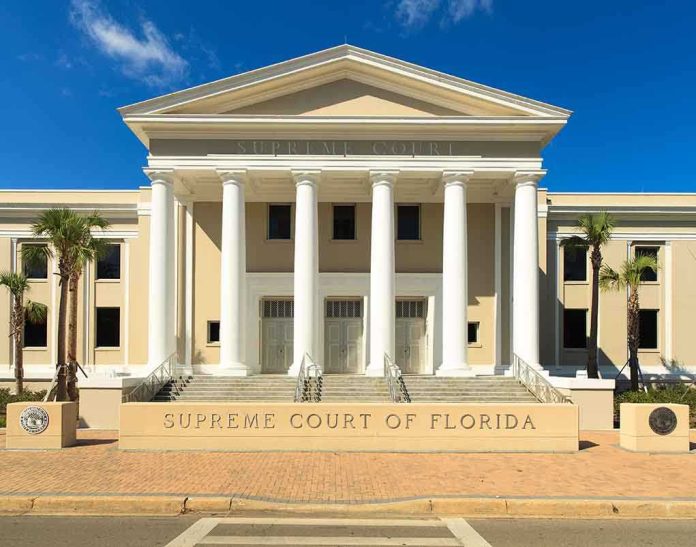🔴 Website 👉 https://u-s-news.com/
Telegram 👉 https://t.me/usnewscom_channel
The Department of Justice is asking the Supreme Court to deliver a definitive ruling on President Trump’s executive order challenging birthright citizenship, setting up a historic constitutional battle that could fundamentally reshape American citizenship rights.
Story Overview
- Trump’s Executive Order 14160 attempts to end birthright citizenship for children born to non-citizen parents
- Federal courts have blocked the order nationwide through multiple injunctions since January 2025
- DOJ seeks Supreme Court review to resolve constitutional questions surrounding the Fourteenth Amendment
- Legal experts warn the order threatens established constitutional protections and could create statelessness
Trump Administration Challenges Constitutional Precedent
President Trump signed Executive Order 14160 on January 20, 2025, marking the first direct executive challenge to birthright citizenship in modern American history. The order aims to deny citizenship to children born in the United States whose parents are neither U.S. citizens nor lawful permanent residents. This unprecedented action directly confronts the Fourteenth Amendment’s Citizenship Clause, which guarantees citizenship to “all persons born or naturalized in the United States, and subject to the jurisdiction thereof.”
The executive order represents a bold attempt to reinterpret constitutional language that has been settled law since the 1898 Supreme Court decision in United States v. Wong Kim Ark. That landmark ruling established that children born in the U.S. to foreign parents are American citizens, excluding only children of diplomats or enemy occupiers. The Trump administration argues for a narrower reading of “subject to the jurisdiction thereof,” claiming it should exclude children of undocumented immigrants.
Federal Courts Block Implementation Nationwide
Within days of the order’s signing, multiple federal courts intervened to halt its enforcement. On January 23, 2025, a federal judge issued a temporary restraining order blocking the directive nationwide. Between February 5-13, additional federal judges issued universal injunctions, preventing the order from taking effect on its scheduled February 19 implementation date. These rapid judicial responses reflect the legal community’s overwhelming view that the order violates established constitutional protections.
The Supreme Court has addressed procedural issues regarding nationwide injunctions but has not ruled on the order’s constitutional merits. In July 2025, the Court first lifted then reinstated the block on the order, creating ongoing uncertainty. The judicial resistance demonstrates the severity of constitutional concerns raised by Trump’s attempt to alter citizenship law through executive action rather than the constitutional amendment process typically required for such fundamental changes.
Constitutional Experts Warn of Dangerous Precedent
Legal scholars across the political spectrum argue that birthright citizenship cannot be eliminated through executive order. Constitutional law professors emphasize that only a constitutional amendment or Supreme Court reversal of established precedent could change birthright citizenship requirements. The Fourteenth Amendment’s text and the Wong Kim Ark precedent provide clear protection for all children born on American soil, regardless of their parents’ immigration status.
Civil rights organizations warn that upholding the executive order would create statelessness for American-born children and establish a dangerous precedent for executive reinterpretation of constitutional rights. The order threatens to fundamentally alter the interpretation of the Fourteenth Amendment, potentially affecting hundreds of thousands of families and undermining a cornerstone principle of American citizenship that has existed for over 150 years.
Supreme Court Decision Will Define Constitutional Authority
The DOJ’s formal request for Supreme Court review sets up what could be the most significant constitutional decision on citizenship in over a century. The Court’s ruling will determine whether executive orders can override established constitutional interpretation and Supreme Court precedent. This case represents a critical test of constitutional limits on executive power and the separation of powers doctrine that protects individual rights from government overreach.
If the Supreme Court upholds the executive order, it would mark a dramatic departure from constitutional precedent and could open the door for future executive reinterpretation of other fundamental rights. The decision, expected in the Court’s next session beginning October 2025, will have profound implications for American citizenship, immigration policy, and the constitutional balance of power that protects individual liberty from government encroachment.
Sources:
Know Your Rights: Birthright Citizenship – NAACP Legal Defense Fund
Executive Order 14160 – Wikipedia
Birthright Citizenship Executive Order FAQ – Stop AAPI Hate
Where Does Birthright Citizenship Order Currently Stand? – SCOTUSblog
